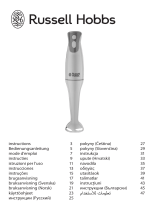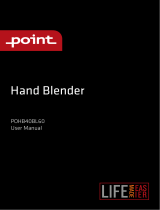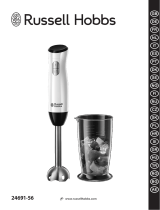Page is loading ...

English 2 - 6
Nederlands 7 - 12
Français 13 - 18
Deutsch 19 - 24
Italiano 25 - 29
Português 30 - 34
Español 35 - 40
Dansk 41 - 45
Svenska 46 - 50
Norsk 51 - 55
Suomi 56 - 60
Türkçe 61 - 65
Ïesky 66 - 70
Magyar 71 - 75
Polski 76 - 81
Русский 82 - 87
Ekkgmij 88 - 93
Slovenčina 94 - 98
Українська 99 - 104
´¸∂w
501 - 901

before using your Kenwood
a
ppliance
●
R
ead these instructions carefully and
retain for future reference.
●
R
emove all packaging and any
l
abels. Throw away the blade covers
from the triblade and the chopper
blade as they are to protect the
blade during manufacture and transit
only. Take care as the blades
are very sharp.
●
Wash all parts - see “care and
cleaning”.
safety
general
●
Take special care when preparing
food for babies, the elderly and
infirm. Always ensure that the hand
blender shaft is thoroughly sterilised.
Use a sterilising solution in
accordance with the sterilising
solution manufacturer’s instructions.
●
Never touch the blades while the
machine’s plugged in.
●
Keep fingers, hair, clothing and
utensils away from moving parts.
●
Unplug after use and before
changing attachments.
●
Never blend hot oil or fat.
●
For safest use it is recommended to
let hot liquids cool to room
temperature before blending.
●
Never use a damaged hand blender.
Get it checked or repaired: see
‘service’.
●
Never put the power handle in water
or let the cord or plug get wet - you
could get an electric shock.
●
Never let the cord touch hot
surfaces or hang down where a child
could grab it.
●
Never use an unauthorised
attachment.
●
Always disconnect the hand blender
from the power supply if it is left
unattended and before assembling,
disassembling or cleaning.
●
Do not allow children to use the
hand blender without supervision.
●
This appliance is not intended for
u
se by persons (including children)
w
ith reduced physical, sensory or
mental capabilities, or lack of
e
xperience and knowledge, unless
t
hey have been given supervision or
instruction concerning use of the
appliance by a person responsible
for their safety.
●
Children should be supervised to
ensure that they do not play with the
appliance.
●
Only use the appliance for its
intended domestic use. Kenwood
will not accept any liability if the
appliance is subject to improper use,
or failure to comply with these
instructions.
●
The maximum rating is based on the
attachment that draws the greatest
load. Other attachments may draw
less power.
chopper attachment
●
Don’t touch the sharp blades.
●
Remove the chopper blade before
emptying the bowl.
●
Never remove the cover until the
chopper blade has completely
stopped.
●
Always hold the chopper blade by
the finger grip away from the cutting
blades, both when handling and
cleaning.
important
●
With heavy mixtures to ensure long
life of your machine, don’t use your
hand blender for longer than 50
seconds in any four minute period.
●
Don’t use the whisk attachment for
longer than 3 minutes in any 10
minute period.
before plugging in
●
Make sure your electricity supply is
the same as the one shown on the
hand blender.
English
2

●
This appliance conforms to EC
d
irective 2004/108/EC on
E
lectromagnetic Compatibility and
EC regulation no. 1935/2004 of
2
7/10/2004 on materials intended
f
or contact with food.
key
hand blender
variable speed control
on button
turbo button
power handle
blender shaft release buttons
blender shaft with fixed triblade.
beaker (if supplied)
beaker
beaker base/lid
pan blender ‘bigfoot’ (if
supplied)
whisk (if supplied)
whisk collar
wire whisk
chopper (if supplied)
chopper cover
finger grip
chopper blade
bowl
bowl base/lid
masher (if supplied)
masher collar
masher foot
masher paddle
to use the hand blender
●
You can blend baby food, soups,
sauces, milk shakes and
mayonnaise.
for beaker blending (if beaker
supplied)
●
Put the base/lid on the bottom of the
beaker. (This stops the beaker sliding
on the worktop).
●
Don’t fill the beaker more than
2/3rds full.
●
After blending you can fit the
base/lid to the top of the beaker.
Note
I
f no beaker is supplied in your pack,
s
elect a suitably sized container. We
would recommend a tall, straight
s
ided vessel with a diameter slightly
l
arger than the foot of the hand
blender to allow movement of the
ingredients but tall enough to
prevent splashing.
for saucepan blending
●
For safest use it is recommended to
take the pan off the heat and let hot
liquids cool to room temperature
before blending.
●
Use the pan blender (if supplied) to
quickly process soups etc., directly
in the saucepan. Alternatively use
the hand blender.
●
Do not use the pan blender to
process uncooked vegetables.
1 Fit the blender shaft to the power
handle – push to lock.
2 Plug in.
3 Place the food into the beaker or a
similar container, then holding the
beaker steady, select the required
speed then press the on button.
(Select a low speed for slower
blending and to minimise splashing
and a higher speed or turbo for
faster blending).
●
To avoid splashing, place the
blade in the food before
switching on.
●
Don’t let liquid get above the join
between the power handle and
blender shaft.
●
Move the blade through the food
and use a mashing or stirring action
to incorporate the mixture.
●
Your hand blender is not
suitable for ice crushing.
●
If your blender gets blocked, unplug
before clearing.
4 After use release the on or turbo
button. Unplug and press the release
buttons to remove the blender
shaft from the power handle.
3

to use the whisk
●
Y
ou can whip light ingredients such
a
s egg whites; cream and instant
desserts.
●
D
on’t whisk heavier mixtures such as
m
argarine and sugar - you’ll damage
the whisk.
1 Push the wire whisk into the whisk
collar .
2 Fit the power handle to the whisk
collar. Push to lock.
3 Place your food in a bowl.
●
Don’t whisk more than 4 egg whites
or 400ml (
3
⁄4pt) cream.
4 Plug in. To avoid splashing, select
speed 1 then press the on button.
To whisk on a faster speed, select a
higher speed or press the Turbo
button. Move the whisk clockwise.
●
Don’t let liquid get above the whisk
wires.
5 After use release the on or turbo
button, unplug and dismantle.
to use the chopper (if
supplied)
●
You can chop meat, vegetables,
herbs, bread, biscuits and nuts.
●
Don’t chop hard foods such as
coffee beans, ice cubes, spices or
chocolate - you’ll damage the blade.
1 Remove any bones and cut food
into 1-2cm (
1
⁄2-1”) cubes.
2 Put the base/lid on the bottom of the
chopper bowl. (This stops the bowl
sliding on the worktop.)
3 Fit the chopper blade over the pin in
the bowl
.
4 Add your food.
5 Fit the chopper cover, turn and lock
.
6 Fit the power handle to the chopper
cover - push to lock.
7 Plug in. Hold the bowl steady. Then
press the turbo button. Alternatively
press the turbo button in short
bursts to achieve a pulsing action.
8 After use, unplug and dismantle.
processing guide
to use the masher (if supplied)
●
The masher can be used to mash
cooked vegetables such as
potatoes, swede and carrot.
●
Don’t mash hard or uncooked foods
- you may damage the unit.
1 Cook the vegetables and drain.
2 Fit the masher collar to the masher
foot by turning in a clockwise
drection
.
3 Turn the masher upside down and fit
the paddle over the central hub and
turn anti clockwise to locate
. (If
the collar isn’t fitted then the
paddle doesn’t secure in
place).
4 Fit the power handle to the masher
assembly - push to lock.
5 Plug in.
6 Place the masher in the saucepan or
bowl etc., and select speed 1 on the
variable control and then press the
on button. Move the masher in an
up and down movement throughout
the mix until the desired result is
achieved.
7 After use release the on button and
unplug.
8 Press the blender shaft release
buttons to release the masher
assembly.
9 Remove the paddle from the masher
by turning clockwise.
10 Unscrew the collar from the masher
foot.
4
f
ood maximum approx. time
amount (in seconds)
Meat 250g 10-15
Herbs 30g 10
Nuts 200g 10-15
Bread 1 slice 5-10
Hardboiled 3 3-5
eggs
Onions 200g pulse

important
●
N
ever use the masher in a saucepan
o
ver direct heat. Always remove the
saucepan from the heat and allow to
c
ool slightly.
●
D
o not tap the masher on the side of
the cooking vessel during or after
mashing. Use a spatula to scrape
excess food away.
●
For best results when mashing never
fill a saucepan etc., more than half
full with food.
care and cleaning
●
Always switch off and unplug before
cleaning.
●
Don’t touch the sharp blades.
●
Take special care when preparing
food for babies, the elderly and
infirm. Always ensure that the hand
blender shaft is thoroughly sterilised.
Use a sterilising solution in
accordance with the sterilising
solution manufacturer’s instructions.
●
Some foods, eg carrot, may
discolour the plastic. Rubbing with a
cloth dipped in vegetable oil may
help to remove discolouration.
power handle, whisk collar,
masher collar and chopper
cover
●
Wipe with a slightly damp cloth, then
dry.
●
Never immerse in water or use
abrasives.
●
Do not dishwash.
blender shaft
either
●
Part fill the beaker or a similar
container with warm soapy water.
Plug into the power supply, then
insert the blender shaft and switch
on.
●
Unplug, then dry
or
●
Wash the blades under running
water, then dry thoroughly
whisk, beaker, chopper bowl,
c
hopper blade, masher foot,
m
asher paddle, beaker and
bowl base/lids
●
W
ash up, then dry.
●
The following parts can be washed
in a dishwasher: blender shaft, pan
blender, whisk (not whisk collar),
masher foot (not masher collar)
masher paddle, chopper bowl, (not
chopper cover), chopper blade,
beaker, beaker and bowl base/lids.
hint on cleaning the masher
foot
●
If food has been allowed to dry onto
the masher attachment, remove the
paddle. Soak the paddle and
masher foot in warm water to soften
and then wash thoroughly.
important - don’t allow the masher
collar to get wet.
service and customer
care
●
If the cord is damaged it must, for
safety reasons, be replaced by
KENWOOD or an authorised
KENWOOD repairer.
If you need help with:
●
using your appliance or
●
servicing or repairs
Contact the shop where you bought
your appliance.
●
Designed and engineered by
Kenwood in the UK.
●
Made in China.
5

IMPORTANT INFORMATION FOR
CORRECT DISPOSAL OF THE
PRODUCT IN ACCORDANCE
WITH EC DIRECTIVE
2002/96/EC.
At the end of its working life, the product
must not be disposed of as urban
waste.
It must be taken to a special local
authority differentiated waste collection
centre or to a dealer providing this
service.
Disposing of a household appliance
separately avoids possible negative
consequences for the environment and
health deriving from inappropriate
disposal and enables the constituent
materials to be recovered to obtain
significant savings in energy and
resources. As a reminder of the need to
dispose of household appliances
separately, the product is marked with
a crossed-out wheeled dustbin.
6

●
Kenwood
.
●
.
2002/96/
,
.
,
.
.
.
9392

Head Office Address:
Kenwood Limited, New Lane, Havant, Hampshire PO9 2NH, UK
www.kenwoodworld.com
Designed and engineered by Kenwood in the UK
Made in China
19746/2
/


